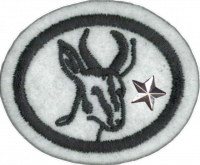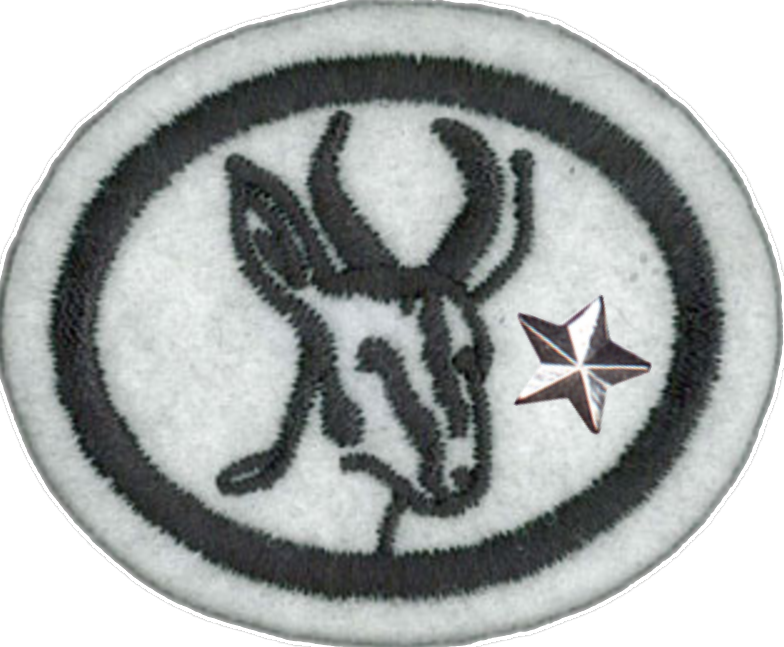Difference between revisions of "AY Honors/Antelopes - Advanced/Requirements"
Jomegat bot (talk | contribs) (Bot: Automated import of articles *** existing text overwritten ***) |
m (- Category of Honor Requirements) |
||
| (8 intermediate revisions by 3 users not shown) | |||
| Line 1: | Line 1: | ||
{{HonorSubpage}} | {{HonorSubpage}} | ||
| − | |||
| − | |||
<section begin=Body /> | <section begin=Body /> | ||
| − | + | <b>1. <section begin=req1 /><noinclude><translate> | |
| − | <b>1. <section begin=req1 /><noinclude><translate></noinclude> | + | <!--T:17--> |
| + | </noinclude>Have the Antelopes honor. | ||
<noinclude></translate></noinclude><section end=req1 /></b> | <noinclude></translate></noinclude><section end=req1 /></b> | ||
| − | <b>2. <section begin=req2 /><noinclude><translate></noinclude>Give the | + | <b>2. <section begin=req2 /><noinclude><translate><!--T:1--> |
| + | </noinclude>Give the order, and the scientific name of the family, to which the antelope belong. | ||
<noinclude></translate></noinclude><section end=req2 /></b> | <noinclude></translate></noinclude><section end=req2 /></b> | ||
| − | <b>3. <section begin=req3 /><noinclude><translate></noinclude> | + | <b>3. <section begin=req3 /><noinclude><translate><!--T:2--> |
| + | </noinclude>Give the distinguishing characteristics of the different sub-families, with examples of each. | ||
<noinclude></translate></noinclude><section end=req3 /></b> | <noinclude></translate></noinclude><section end=req3 /></b> | ||
| − | <b>4. <section begin=req4 /><noinclude><translate></noinclude> | + | <b>4. <section begin=req4 /><noinclude><translate><!--T:3--> |
| + | </noinclude>Which large antelope differs from most of the others in appearance? What are some of its peculiar habits? | ||
<noinclude></translate></noinclude><section end=req4 /></b> | <noinclude></translate></noinclude><section end=req4 /></b> | ||
| − | <b>5. <section begin=req5 /><noinclude><translate></noinclude> | + | <b>5. <section begin=req5 /><noinclude><translate><!--T:4--> |
| + | </noinclude>What is the function of musk glands in the antelopes? Where are these glands situated on the gregarious types? On the solitary types? | ||
<noinclude></translate></noinclude><section end=req5 /></b> | <noinclude></translate></noinclude><section end=req5 /></b> | ||
| − | + | <b>6. <section begin=req6 /><noinclude><translate><!--T:5--> | |
| − | <noinclude></translate></noinclude><section end= | + | </noinclude>Which species could you expect to find in: |
| + | <noinclude></translate></noinclude><section end=req6 /></b> | ||
| − | :<b> | + | :<b>a. <section begin=req6a /><noinclude><translate><!--T:6--> |
| − | <noinclude></translate></noinclude><section end= | + | </noinclude>Bush, or reed beds, near water? |
| + | <noinclude></translate></noinclude><section end=req6a /></b> | ||
| − | :<b> | + | :<b>b. <section begin=req6b /><noinclude><translate><!--T:7--> |
| − | <noinclude></translate></noinclude><section end= | + | </noinclude>Arid regions? |
| + | <noinclude></translate></noinclude><section end=req6b /></b> | ||
| − | :<b> | + | :<b>c. <section begin=req6c /><noinclude><translate><!--T:8--> |
| − | <noinclude></translate></noinclude><section end= | + | </noinclude>Open plains? |
| + | <noinclude></translate></noinclude><section end=req6c /></b> | ||
| − | :<b> | + | :<b>d. <section begin=req6d /><noinclude><translate><!--T:9--> |
| − | <noinclude></translate></noinclude><section end= | + | </noinclude>Scrub and forest areas? |
| + | <noinclude></translate></noinclude><section end=req6d /></b> | ||
| − | <b> | + | :<b>e. <section begin=req6e /><noinclude><translate><!--T:10--> |
| − | <noinclude></translate></noinclude><section end= | + | </noinclude>The vicinity of rocky kopjes, or on hillsides? |
| + | <noinclude></translate></noinclude><section end=req6e /></b> | ||
| − | <b>7. <section begin=req7 /><noinclude><translate></noinclude> | + | <b>7. <section begin=req7 /><noinclude><translate><!--T:11--> |
| + | </noinclude>Describe the horns, in both sexes of each species, of 15 different antelopes. What is the structure of these horns? Are there any deer in South Africa? What is the structure of their horns? | ||
<noinclude></translate></noinclude><section end=req7 /></b> | <noinclude></translate></noinclude><section end=req7 /></b> | ||
| − | <b>8. <section begin=req8 /><noinclude><translate></noinclude> | + | <section begin=challenge /> |
| + | <b>8. <section begin=req8 /><noinclude><translate><!--T:12--> | ||
| + | </noinclude>Name at least 20 species of antelope that you have observed and can identify out-of-doors, not more than 5 of which are in captivity. | ||
<noinclude></translate></noinclude><section end=req8 /></b> | <noinclude></translate></noinclude><section end=req8 /></b> | ||
| + | <section end=challenge /> | ||
| − | <b>9. <section begin=req9 /><noinclude><translate></noinclude> | + | <b>9. <section begin=req9 /><noinclude><translate><!--T:13--> |
| + | </noinclude>What is a gazelle? Where would you find this animal? | ||
<noinclude></translate></noinclude><section end=req9 /></b> | <noinclude></translate></noinclude><section end=req9 /></b> | ||
| − | <b>10. <section begin=req10 /><noinclude><translate></noinclude> | + | <b>10. <section begin=req10 /><noinclude><translate><!--T:14--> |
| + | </noinclude>Name some diseases associated with wild bovies. How are they transmitted? Of what economic importance are they to man? | ||
<noinclude></translate></noinclude><section end=req10 /></b> | <noinclude></translate></noinclude><section end=req10 /></b> | ||
| + | |||
| + | <b>11. <section begin=req11 /><noinclude><translate><!--T:15--> | ||
| + | </noinclude>Know the game laws of your province. | ||
| + | <noinclude></translate></noinclude><section end=req11 /></b> | ||
<section end=Body /> | <section end=Body /> | ||
| − | |||
| − | |||
| − | |||
| − | |||
| − | |||
| − | |||
Latest revision as of 19:42, 20 July 2022
1. Have the Antelopes honor.
2. Give the order, and the scientific name of the family, to which the antelope belong.
3. Give the distinguishing characteristics of the different sub-families, with examples of each.
4. Which large antelope differs from most of the others in appearance? What are some of its peculiar habits?
5. What is the function of musk glands in the antelopes? Where are these glands situated on the gregarious types? On the solitary types?
6. Which species could you expect to find in:
- a. Bush, or reed beds, near water?
- b. Arid regions?
- c. Open plains?
- d. Scrub and forest areas?
- e. The vicinity of rocky kopjes, or on hillsides?
7. Describe the horns, in both sexes of each species, of 15 different antelopes. What is the structure of these horns? Are there any deer in South Africa? What is the structure of their horns?
8. Name at least 20 species of antelope that you have observed and can identify out-of-doors, not more than 5 of which are in captivity.
9. What is a gazelle? Where would you find this animal?
10. Name some diseases associated with wild bovies. How are they transmitted? Of what economic importance are they to man?
11. Know the game laws of your province.


